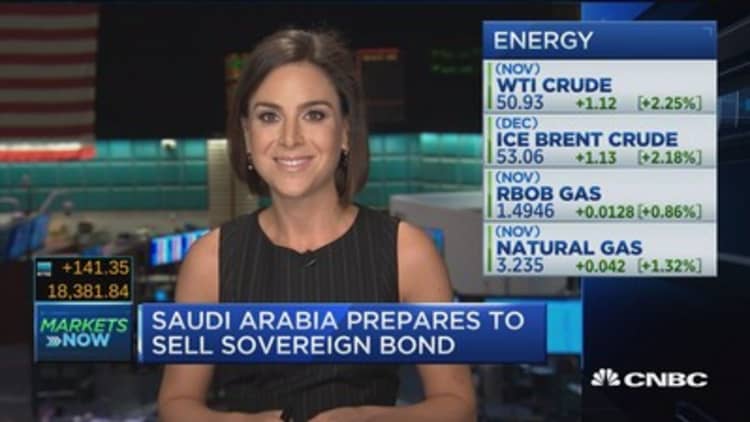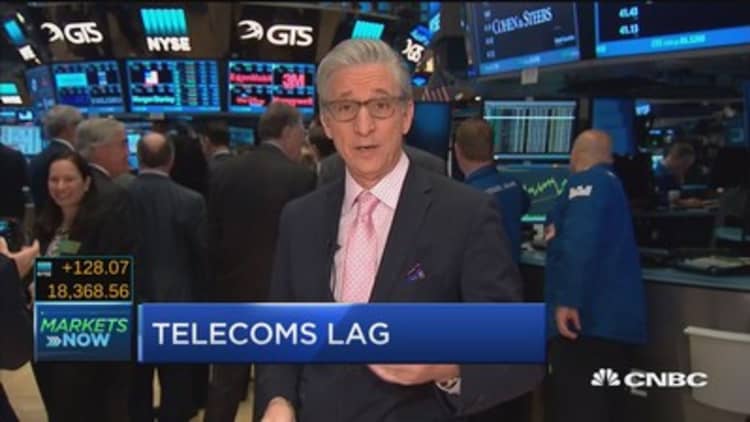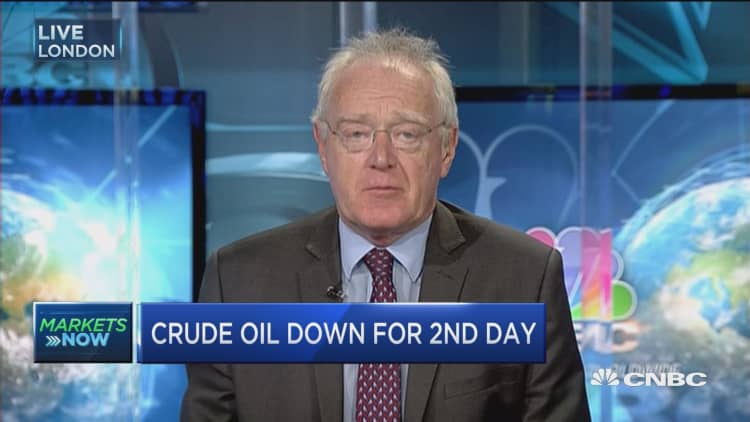
U.S. crude futures settled at their highest level in more than a year on Monday after Russia said it was ready to join OPEC in curbing crude output.
Algeria's oil minister said he expected similar commitments from other non-OPEC producers.
Sentiment was also boosted by a rally in Wall Street shares and news that work was underway for the launch of the first sovereign bond issue of No. 1 crude exporter Saudi Arabia before the eventual listing of the kingdom's state-oil company Aramco.
U.S. futures settled up $1.35, or 3.1 percent, at $51.35 a barrel, the highest level since Oct. 15, 2015. They topped out at $51.60 intraday, the highest level since June 9.
Global benchmark Brent crude futures were up $1.06, or 2 percent, at $52.99 a barrel at 2:41 p.m. ET (1841 GMT). They earlier reached a peak of $53.73, the strongest level since Oct. 9, 2015.

Russian President Vladimir Putin said an output freeze or even a production cut were likely the only right decisions to maintain energy sector stability.
"Russia is ready to join the joint measures to cap production and is calling for other oil exporters to join," Putin said, speaking at an energy congress in Istanbul.
The Organization of the Petroleum Exporting Countries (OPEC) aims to agree on cutting about 700,000 barrels per day, bringing its output to 32.5-33 million bpd by the time it meets in Vienna for its policy meeting on Nov. 30. OPEC has also asked Russia and other non-members to join in making cuts.
OPEC's current output stands at a record 33.6 million bpd.
"Putin coming out to say Russia will be part of the initiative has added another layer of credence to the speculation there will be a coordinated cut," said John Kilduff, partner at New York energy hedge fund Again Capital.
"At some point, the market will call them on it and say 'show us the cuts.' And at that point, the Saudis might be willing to underwrite the cuts on their own because they really want these high prices. To me, $55 Brent is without doubt the next target," he said.
Saudi Energy Minister Khalid al-Falih said he was optimistic of deal by November. His Algerian counterpart Nouredine Bouterfa said he expected to see "commitments" on cuts from non-OPEC oil producers at meetings in Istanbul this week.

Money managers have amassed their largest bullish position in U.S. crude futures in more than four months on OPEC's planned output cut, data showed on Friday.
"History would suggest that a large amount of room still exists for additional speculative entry into the long side, at least enough to associate with our upside expectation of about $52" for WTI, said Jim Ritterbusch of Chicago-based oil markets consultancy Ritterbusch & Associates.
Earlier in the day, concern over OPEC's ability to hammer out a deal had brought some speculators to unwind bullish bets.
Saudi Arabia's Falih said on Monday that OPEC should not cut oil supply too steeply, hinting at milder market intervention.
"It is a very gentle hand on the wheel, we are not doing anything dramatic," Falih said, speaking at the World Energy Congress in Istanbul, where several oil producers will hold sideline talks.
Analysts at ABN Amro took a cautious view on an OPEC deal, saying previous hints by the group at output cuts have always failed to have been followed up by action.
"Adding to these doubts is the realization that certain OPEC countries are demanding to be treated as exceptions," analysts said, referring to Libya and Nigeria, whose production has been affected by domestic unrest.

OPEC members Iran and Iraq are also not attending this week's Istanbul meetings, sources told Reuters, despite previous expectations that they would be present.
Even if producers reach an output deal, analysts are unconvinced it would result in much higher prices as the announced cuts aren't deep and there are doubts over the feasibility of a cut among rivaling members, a Reuters poll showed on Friday.
Pouring cold water on expectations, OPEC's second biggest producer Iraq said over the weekend that it wants to raise output further in 2017.
Weekly U.S. rig count data added to bearish news as totals rose to the highest since February, showing that shale producers are already gearing up for a production ramp-up.

